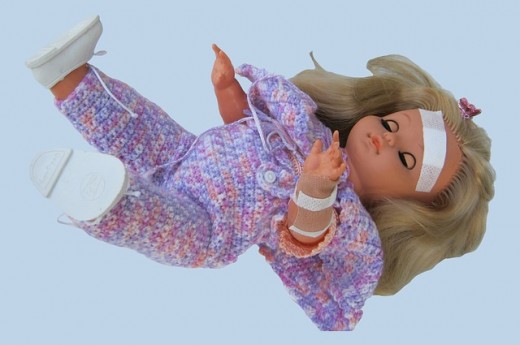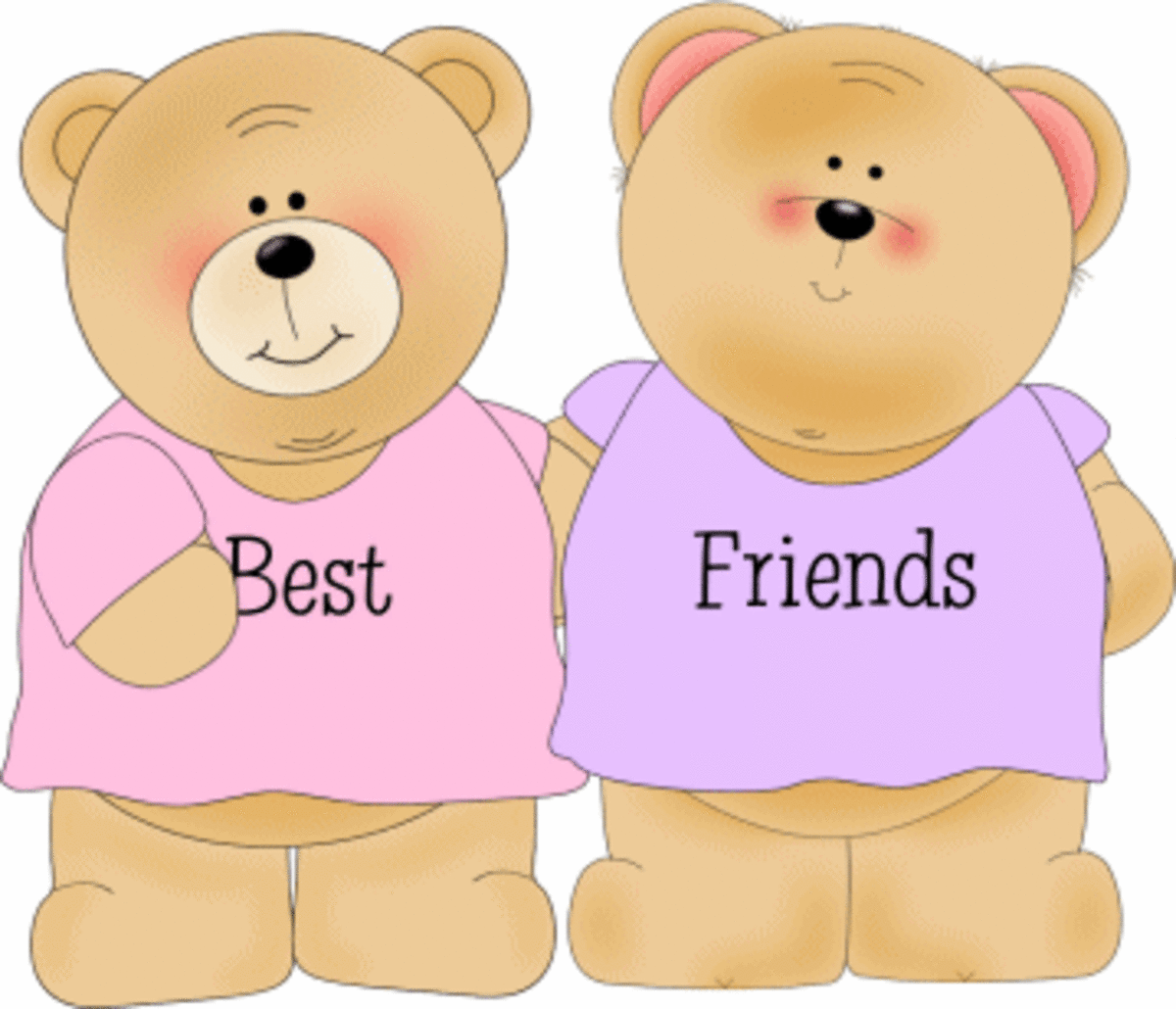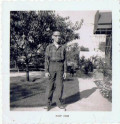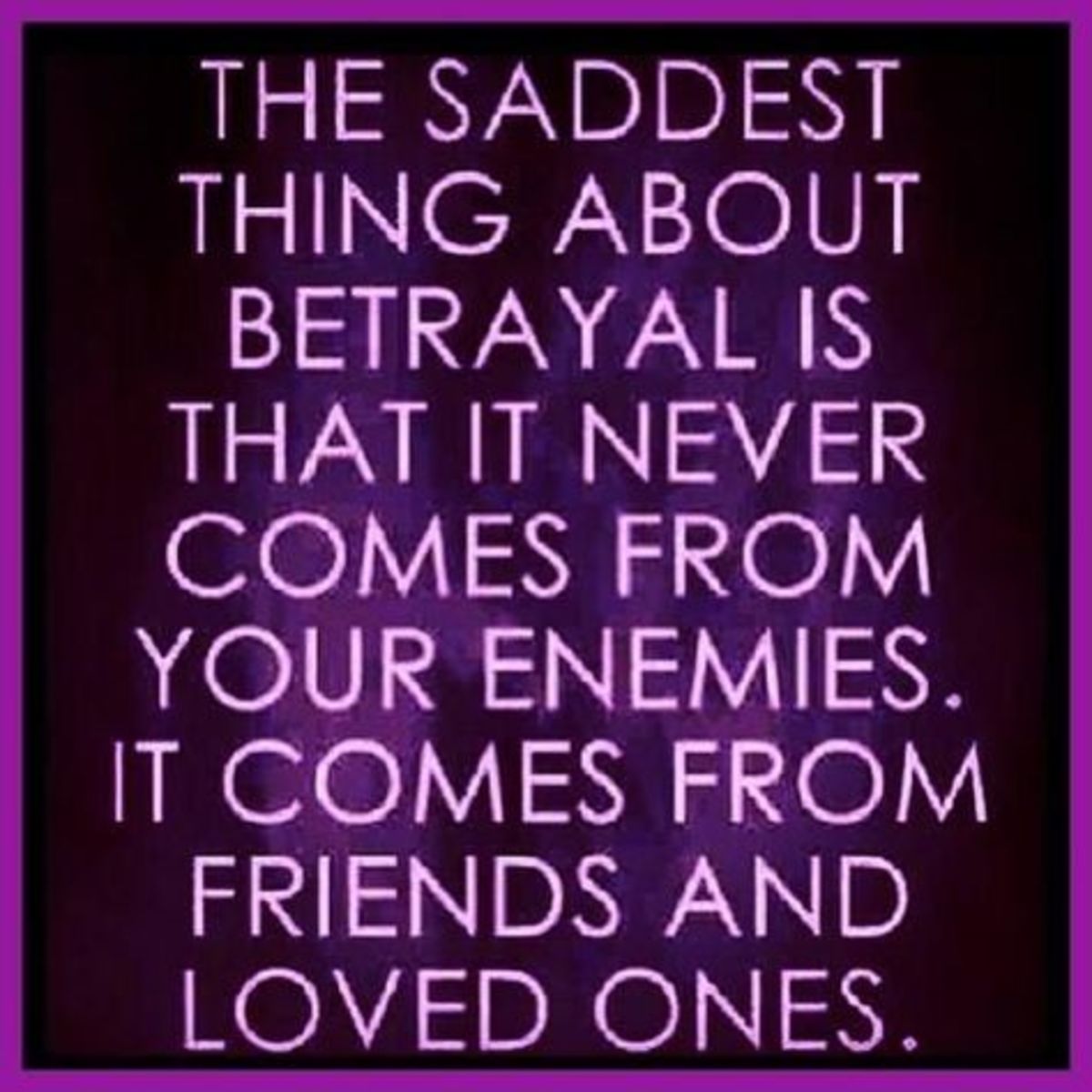Surviving a Friend's Betrayal
I Had No Idea My Friend was Dishonest
At one time we had many friends and acquaintances in our church. Then, suddenly, people started avoiding us.
I didn't know why.
But the shunning was real and tangible. And it hurt. Our children had previously been active, happy participants in a religious setting that attracted many young families, just like ours. We had been there for years. It was a respite from all the crazy stuff going on in the world.
Only it soon it would become crazier than the outside world.
Our daughter was among the first to feel the effects of whatever was going on. All of the young girls were recruited to sing in the choir, except for her.
My adolescent son loved to serve at the altar. But, suddenly, scheduling problems arose.
All of this coincided with a toxic cloud descending upon our once happy community. An altar society was formed and the boys were handed a thick book of rules they needed to follow. Boys could be arbitrarily booted from serving if they didn't meet a very subjective set of standards, such as being found "not worthy." This could be decided in front of all their friends at a community meeting.
I worried this was a very risky and possibly faith-destroying proposition for our family, considering that our standing had mysteriously plummeted.
During this time, I shared my concerns in a very general manner, without mentioning anyone specifically by name, with one of the last people still friendly to us. She was sympathetic. She was well aware of our troubles, as were many others, since they spilled over into an online community forum. She gave me a book about accepting this as God's will. (Which I realize it was.)
At the time, though, I should have wondered why she remained so popular. Actually, she was the hub of most social activity and her standing was soaring. She had the power to stop whatever was going on, because, at the time, many people sought her friendship and approval.
Eventually, this woman also became cold and standoffish, but I took her word that this was because she was dealing with a lot of personal problems.

One Mistake I Made
Suddenly, for a stretch, she warmed up. She wanted to meet my best friend, who worshiped elsewhere. My best friend was eager to meet other families with young children, so I introduced them to one another.
That's a decision I regret.
This particular "friend," who is very charming and persuasive, immediately discarded me after the introduction. Emails came back with one-word answers. One time she refused to come to the phone, because I wanted to say "hello," when I happened to call my best-friend's house and she was there visiting.
When I asked, again, if anything was wrong, she insisted it was nothing and that she was just busy.
Yet she had seemingly unlimited time for my best friend. The two families became entwined. My former friend's children started calling my best friend "Auntie." They were at "Auntie's" house a lot.
It soon reached the point where I didn't see my best friend much because my former friend now monopolized her time. After a while, I wasn't even sure I wanted to see my best friend, given the circumstances. Although I know she still wanted to spend time with me, her already tightly packed schedule left little room to do so.
This was a very lonely period as most of my other ties, which revolved around our church community, were broken.
What happened at our former church was much like workplace mobbing, only it wasn't in an office. I realize these things can happen in any group with one or more highly competitive, narcissistic people in the mix. But you don't expect it to happen at church. (I hope anyone reading this is not scandalized. Despite all that transpired, I still go to church and my faith is intact. We are Catholic and I don't intend this as a slam against the Catholic Church. This happens in the secular world, and in Catholic, protestant and evangelical congregations alike.)
The Breaking Point
Two years later, the relationship with my best friend reached a breaking point, as I wanted to get away from this unhealthy dynamic.
This was around the same time I gained more clarity. My former friend wasn't too tired, too busy or too stressed to continue the relationship. She had simply discarded me, while, at the same time, she had struck up a relationship with my best friend. This was an inherent flaw in her personality, which I couldn't fix.
Once I saw this for what it was, I resolved to free myself from this mess and expand my social circle. It was an excruciating revelation, but it felt so good to get away from this toxic triangle.
I started accepting other social invitations while praying that God would send the right people into my life.
I also stopped calling my best friend as frequently, as the situation was hurtful. I told her exactly how I felt and why I felt that way.

Why We're Seeing More Character Disturbance Today?
Confronting a Betrayer
Evidently, my best friend was also uncomfortable. It was clear she valued our friendship. Stuck in the middle, and holding all the leverage, she confronted the other woman.
She didn't get a straight answer, which is the typical response when dealing with someone with a character disturbance. I received the same runaround. My former friend insisted she was too "busy" to speak with me. Then, she called me and gave me a litany of weak reasons, all my fault, why she had cut off contact. I held my ground and refuted each argument.
The next evening she drove to my best friend's house in tears, worried their friendship was on the line. (Which it apparently was.) She also called me and apologized again. She insisted she wanted to resume the friendship. Yet, when I happened to run into her the next evening, at a church event, she was aloof. Letting her back into my life would be foolish.

Dealing with Betrayal
Trying to Resolve the Situation
My best friend and I have repaired our frayed friendship, although I'm more interested than before in meeting new people. I've since learned there's a psychological term for this type of behavior, where one party shows greatly preferential treatment toward another. It's called "favoritism" and it's a tool used as a dividing wedge in relationships.
I still feel blessed and grateful to God, despite what happened at our former church, and I'm thankful for the new insight's He's given me, and how, after a period of trial, He brings good from the struggle. He has shown me our salvation rests on Him alone.
Now I realize that being a good Christian doesn't mean being a doormat.
Another positive outcome is that I'm using this as opportunity to connect with people who don't act this way. And if someone does, hopefully, I'll recognize a disturbed personality and run the other way. I'd rather have one good friend, or even none, than to have a deceiver in my midst.
However, I'm still saddened my children's formative years were marked by this type of turmoil.
In retrospect, I should have heeded warning signs about my former friend. I should have recoiled at the subtle insults, disguised as concern, she'd sometimes toss. True friends don't do that. They care about your feelings. They say uplifting things. They make you feel better.
Another red flag was that sometimes she was rude, for no reason. On occasion she'd apologize. But this happened too many times. True friends act with charity.
There were many other clues too. I can't prove, beyond a shadow of a doubt, she was responsible for our difficulties at church, but it's hard not to be suspicious. There were also changes in chaplains. A complicating factor was a series of temporary priests led the community during this time, and it was this weak and transient leadership that allowed this type of hatefulness to flourish.
It's been a painful experience, but I've learned a lot. I hope others who find themselves in a similar situation can learn from my story. If a relationship shows signs of being toxic, get out. And if you find yourself in a toxic environment, get out. It's always a losing proposition, and you're never going to win.
Malignant Narcissism Blogs
- The Friendship Blog - Expert Advice for Navigating Friendship Problems at Every Stage of Life. Creat
- Why Are Women So Mean to One Another?
A discussion of adult female bullies, whom often suffer from malignant narcissism.
Dealing with Narcissistic Friends
Disclosure
I am a participant in the Amazon Services LLC Associates Program, an affiliate advertising program designed to provide a means for sites to earn advertising fees by advertising and linking to amazon.com.











